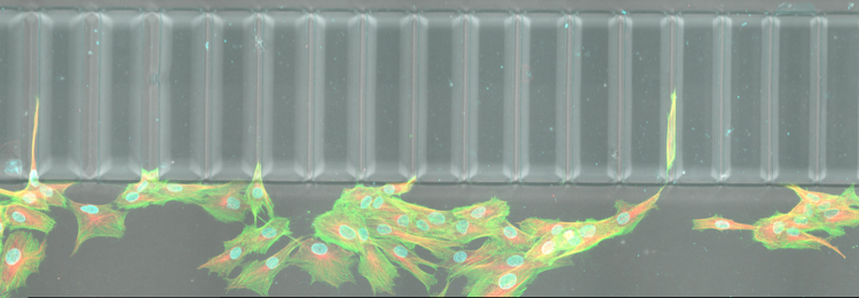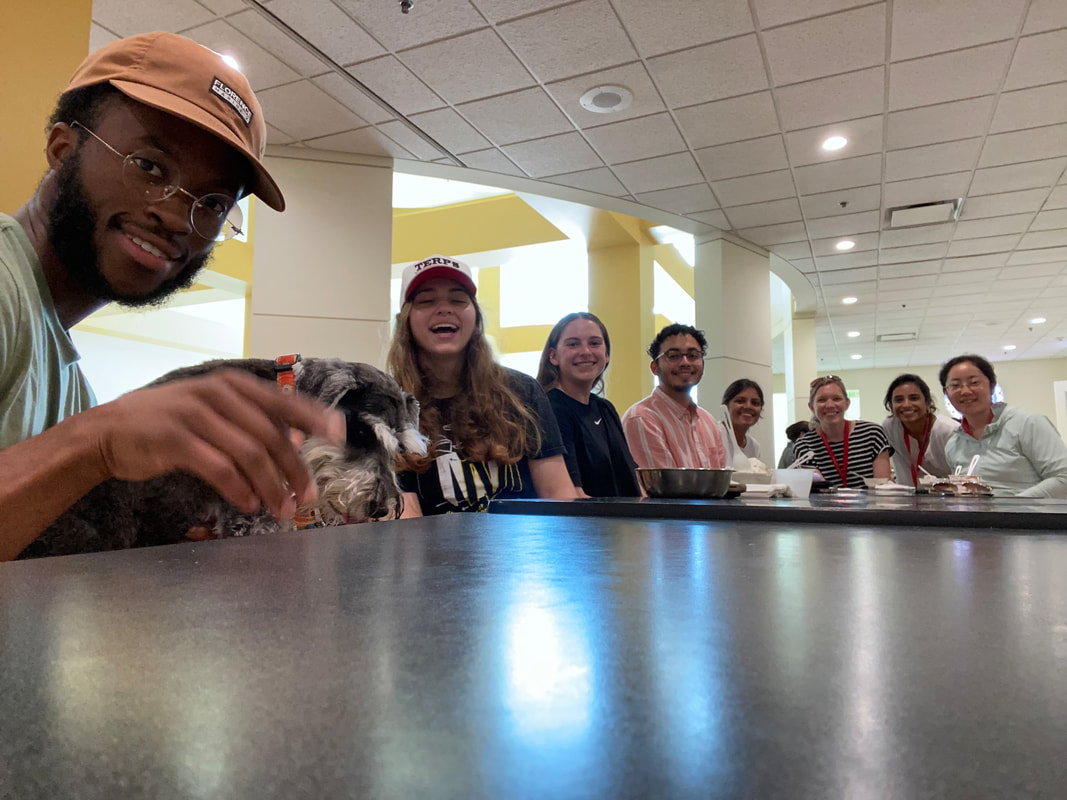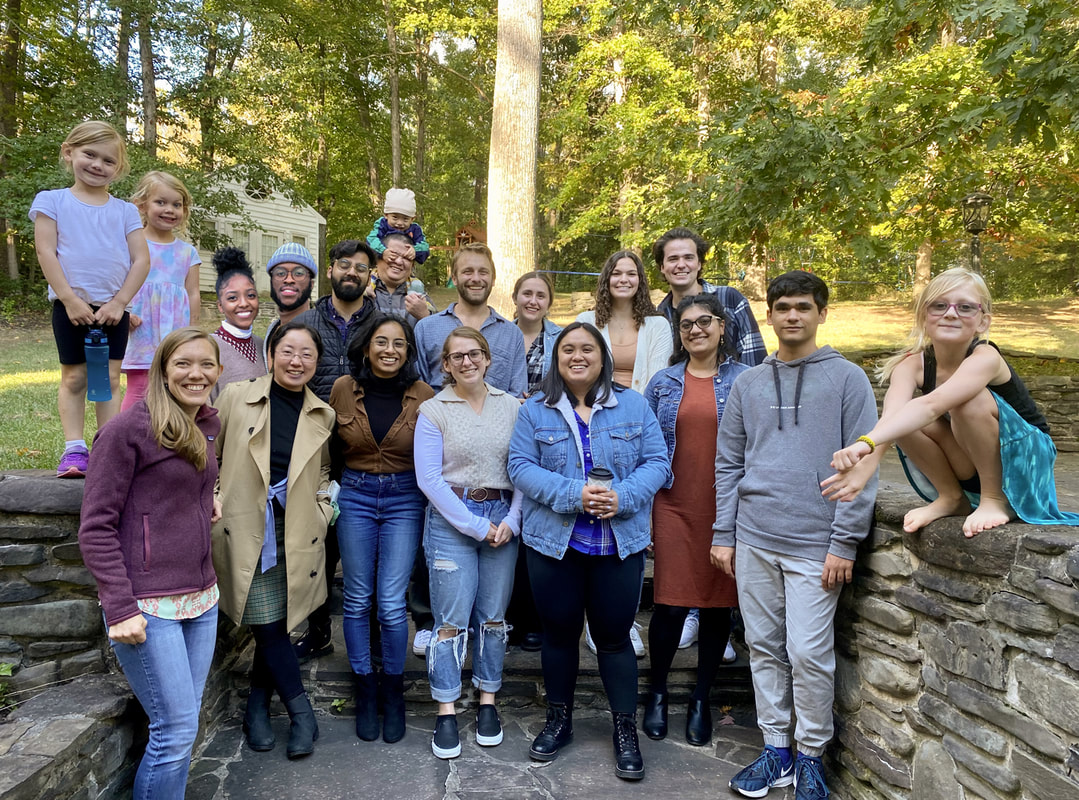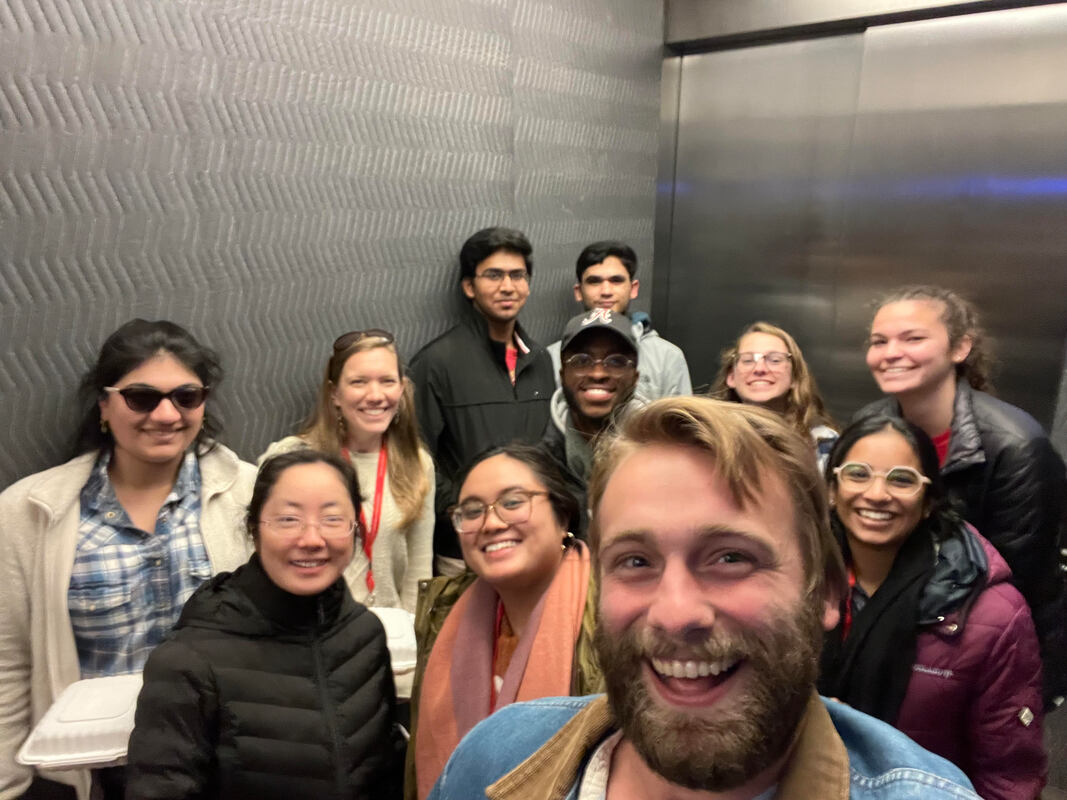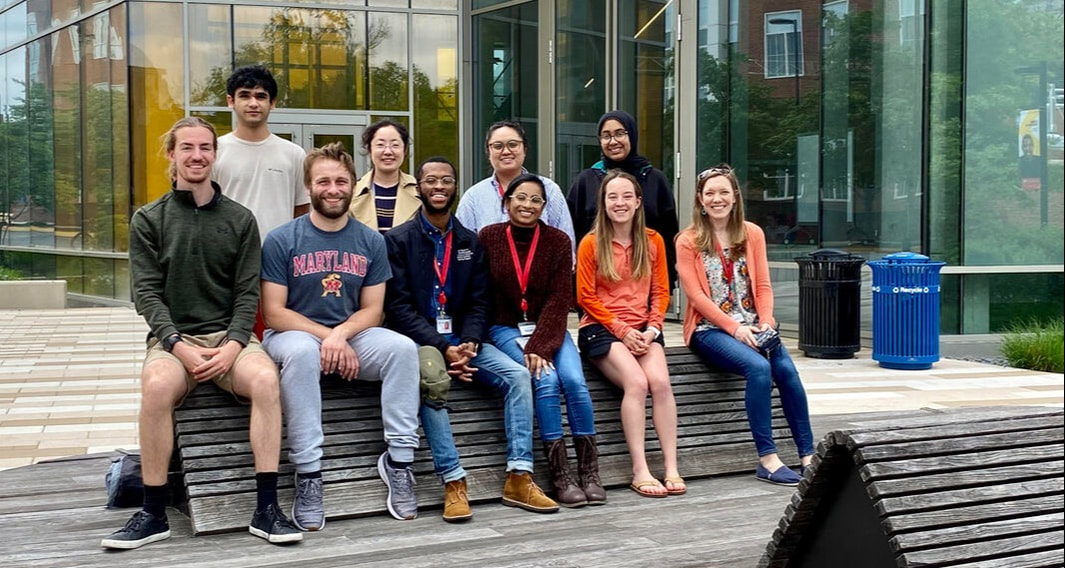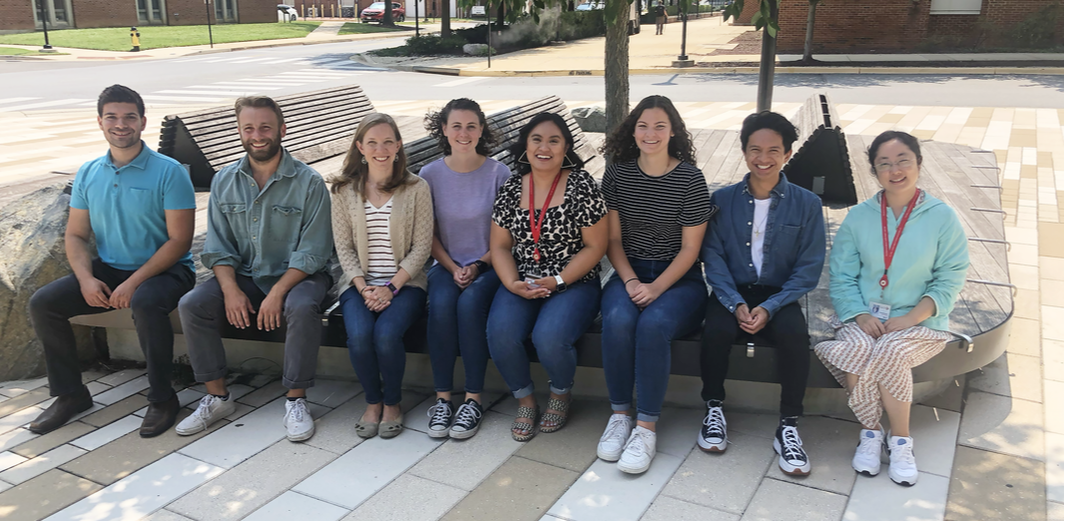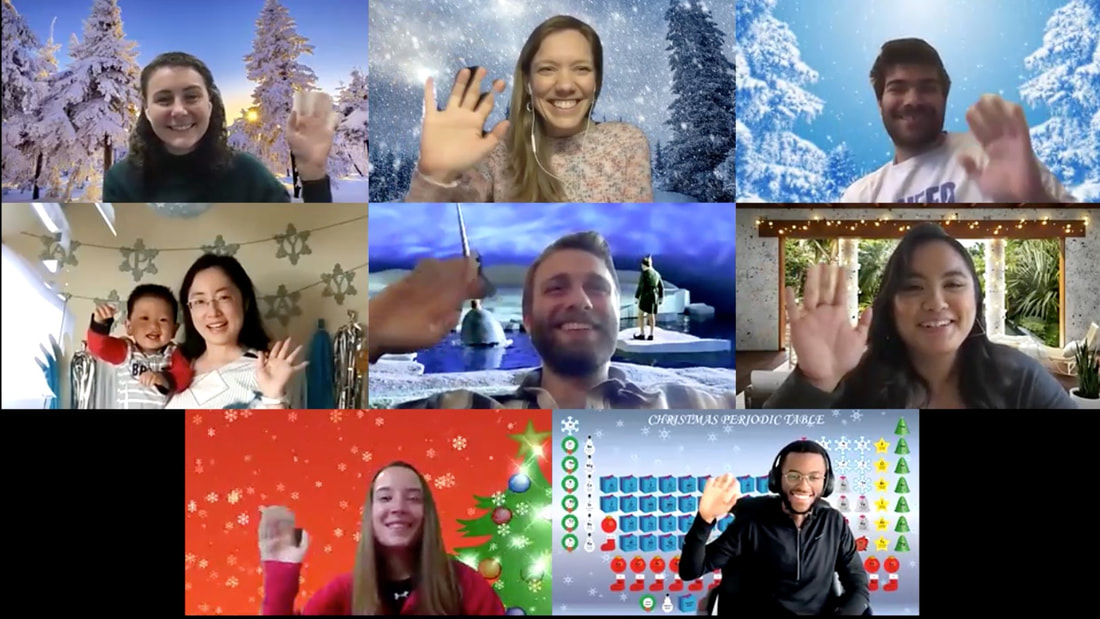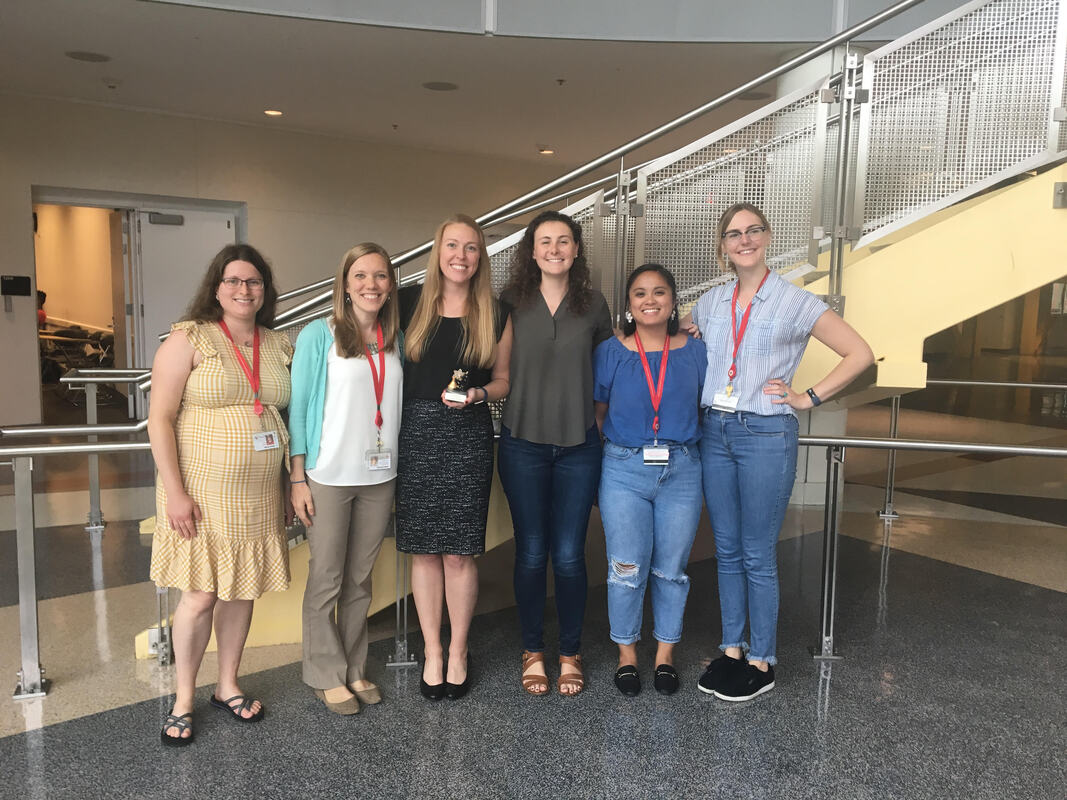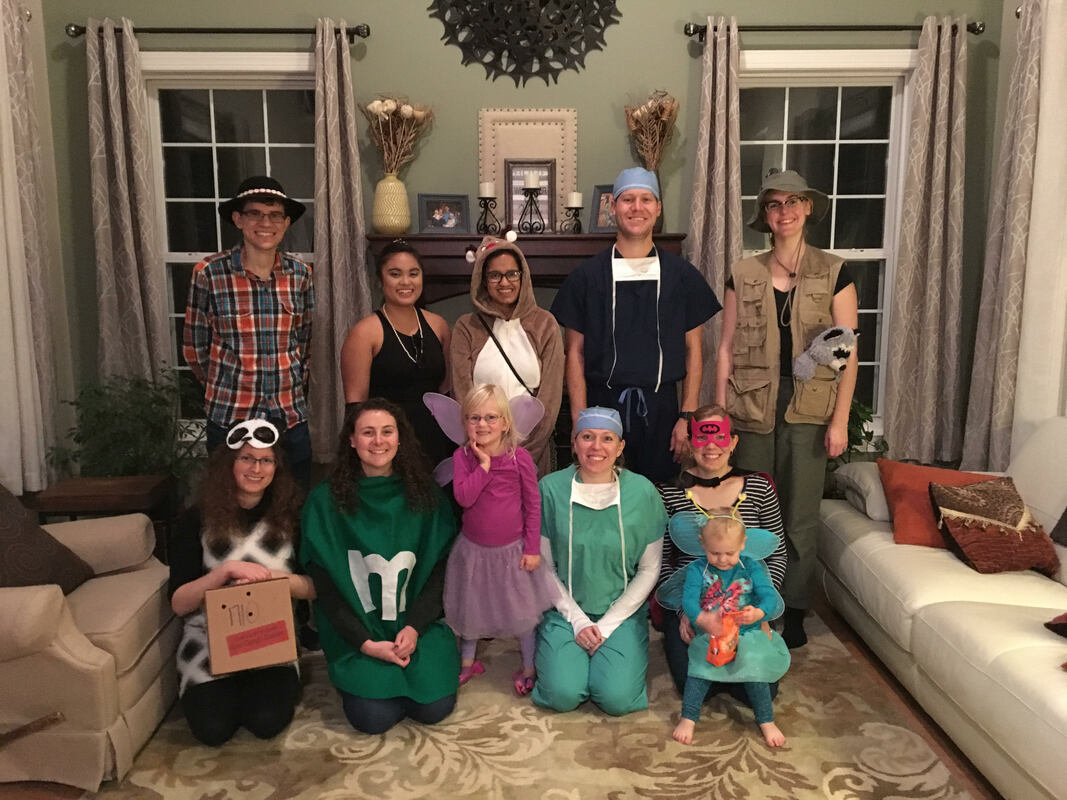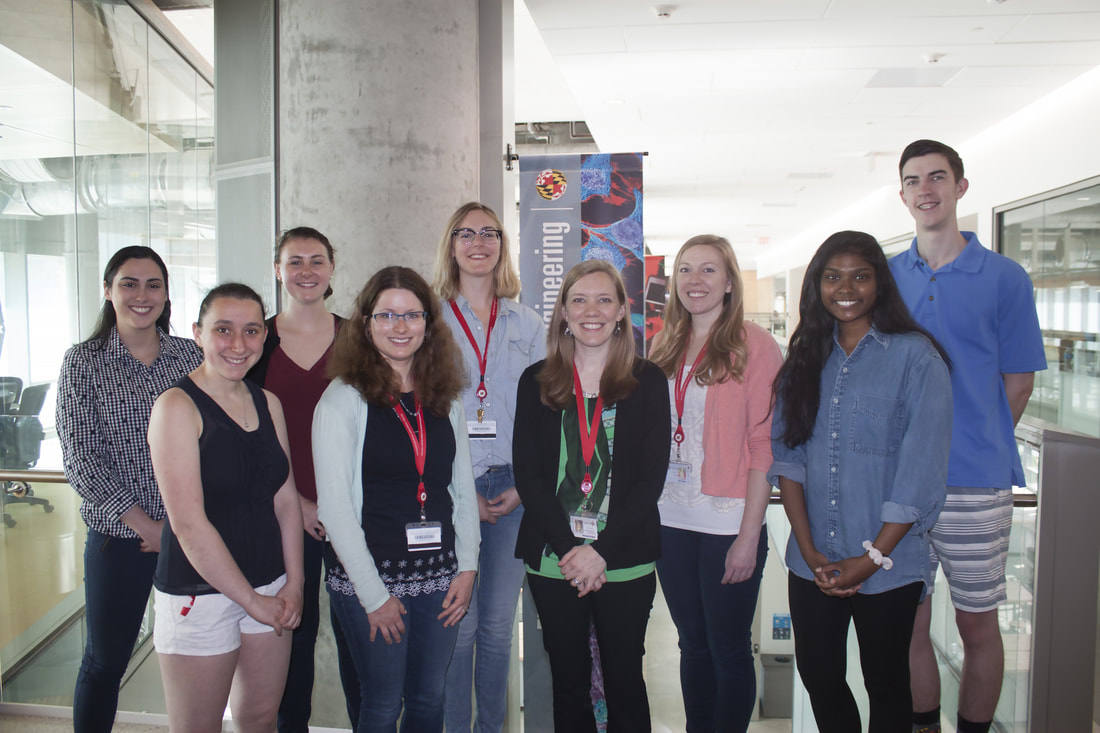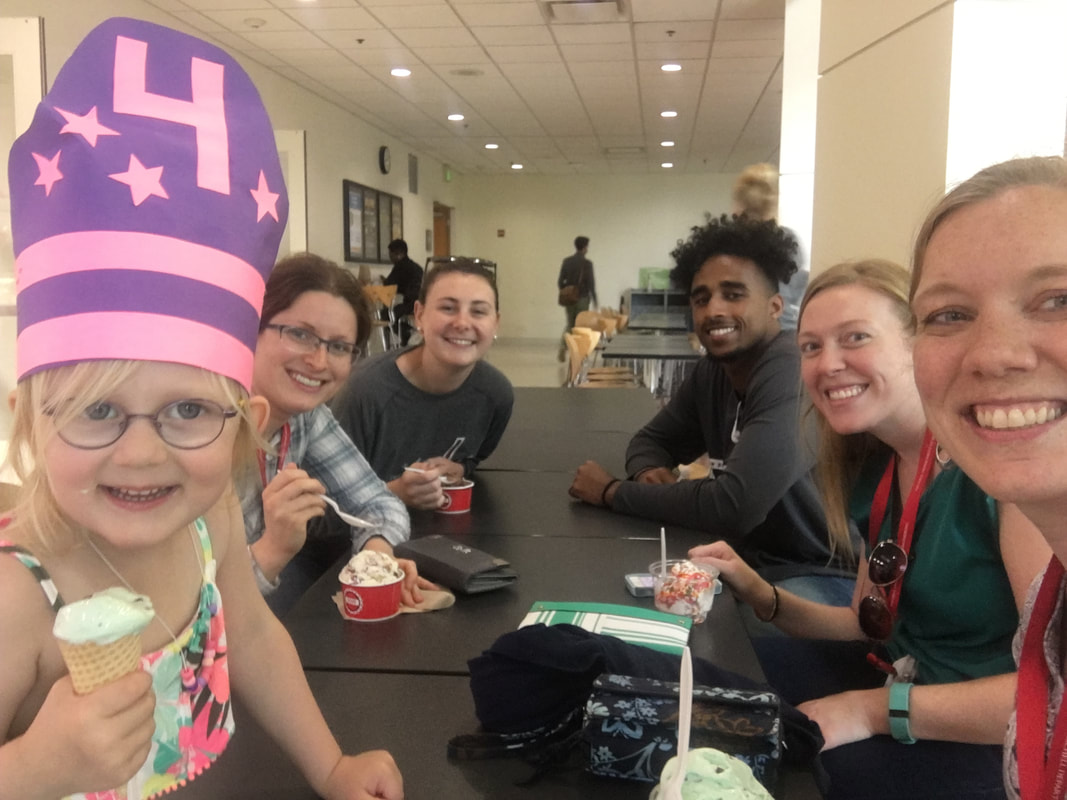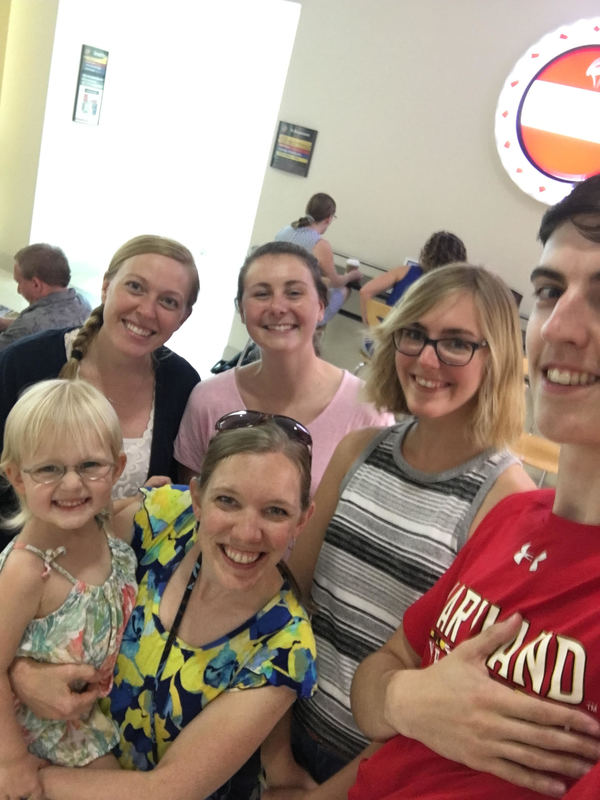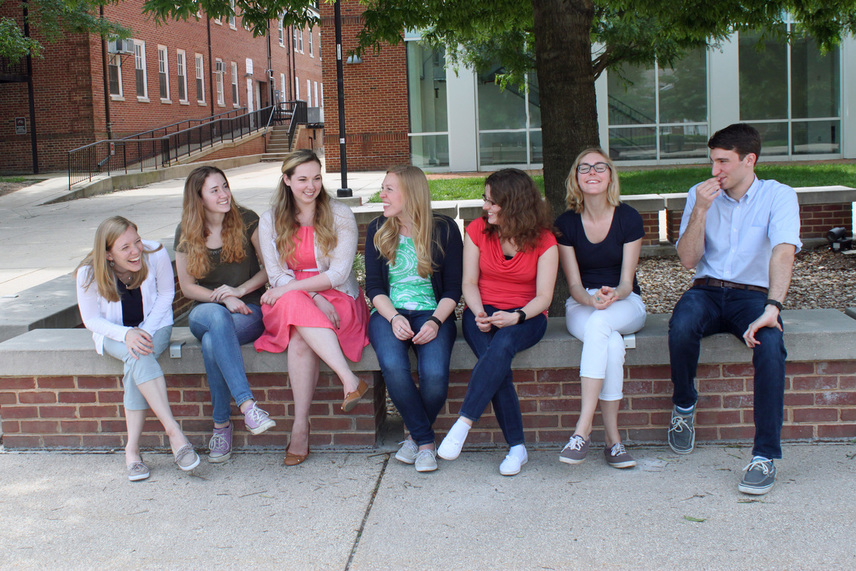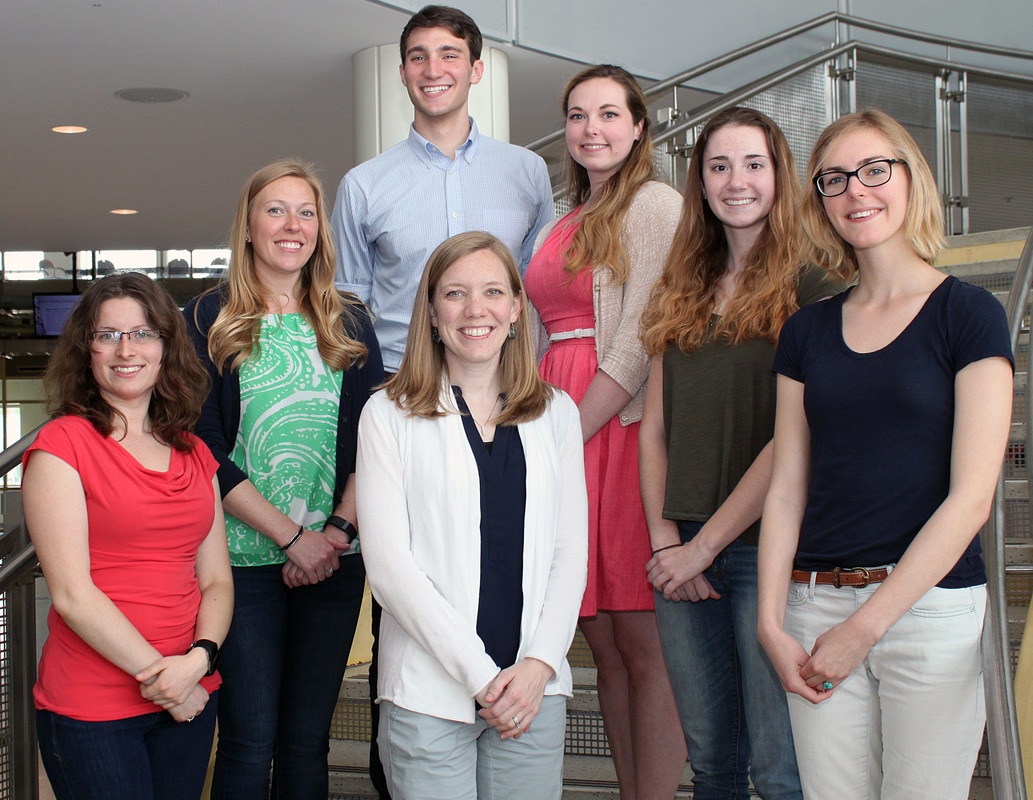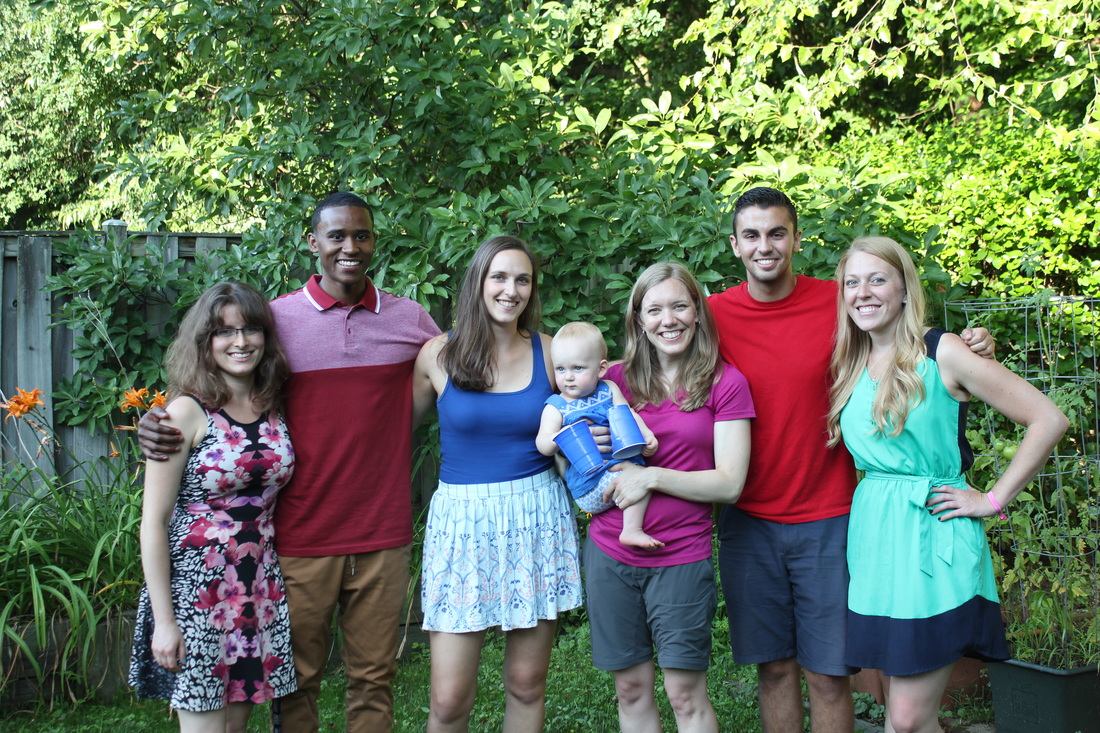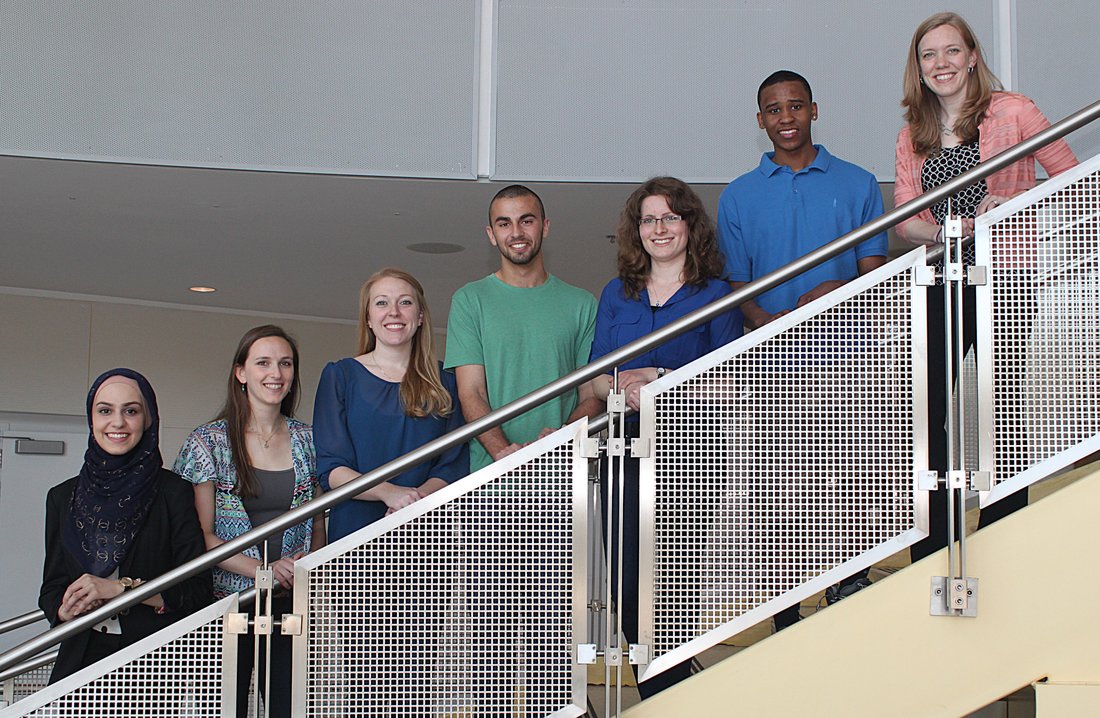Meet Our Team!
Principal Investigator
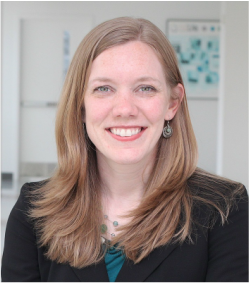
Professor Kimberly Stroka
In January 2015 Dr. Kimberly Stroka began her appointment as Assistant Professor at the University of Maryland, College Park in the Fischell Department of Bioengineering, and was promoted to Associate Professor in July 2021. She heads the Cell and Microenvironment Engineering Lab. She completed her postdoctoral training at Johns Hopkins University in the Department of Chemical and Biomolecular Engineering and Institute for NanoBioTechnology. She received her Ph.D. in Bioengineering in 2011 from the University of Maryland, College Park and her B.S. summa cum laude in Physics in 2006 from Denison University. In her PhD work with Dr. Helim Aranda-Espinoza, Dr. Stroka developed a novel hydrogel-based in vitro model and used it to evaluate the effects of vascular matrix stiffening on endothelial cell biomechanics, leukocyte mechanosensing, and leukocyte transmigration, during a normal immune response and in the context of cardiovascular disease. In Dr. Stroka’s postdoctoral work with Dr. Konstantinos Konstantopoulos at Johns Hopkins University, she integrated microfabrication, molecular biology, live cell imaging, and theoretical modeling in order to uncover a not-yet understood mechanism by which metastatic tumor cells migrate through confined microenvironments.
Dr. Stroka’s postdoctoral and predoctoral research were supported by an NIH NRSA F32 postdoctoral fellowship (2013-2014), NIH T32 postdoctoral fellowship (2012-2013), NIH NRSA F31 predoctoral fellowship (2010-2011), and NSF Graduate Research Fellowship (2006-2009). Dr. Stroka was also awarded the Burroughs Wellcome Career Award at the Scientific Interface (2014-2019) for her proposal on engineering blood-brain barrier mechanobiology in the context of tumor cell metastasis. As a PI at UMD, she was awarded the NSF CAREER Award (2020-2025) and NIGMS MIRA (2021-2026), received the 2014 Rita Schaffer Young Investigator Award from the Biomedical Engineering Society (BMES), and was recognized as a 2019 Cellular and Molecular Bioengineering Young Innovator. She also received the Research and Scholarship Award from the University of Maryland Graduate School for Summer 2017, as well as the 2017 Outstanding Young Scientist Award from the Maryland Academy of Sciences and Maryland Science Center.
Dr. Stroka is passionate about teaching and mentoring and regularly teaches several classes, including Biomechanics, Stem Cell Engineering, and Bioengineering Design and Teamwork. She was awarded the 2018 and 2019 Faculty Teaching Award from UMD's Fischell Department of Bioengineering, the Phillipp Merrill Faculty Mentor Award (from UMD; 2020), the Clark School of Engineering's 2020 E. Robert Kent Teaching Award for Junior Faculty, and the Winston Honors Faculty Award (from UMD; 2022). She also was also awarded a Teaching Innovation Grant in summer 2020 from the UMD Provost's Office to redesign her courses to include new technologies and strategies for engaging students in online and hybrid courses. Dr. Stroka is also one of the Directors of the new MARC at University of Maryland program, which provides funding for undergraduate students to pursue research and prepare for research-focused higher degree programs. Dr. Stroka is a co-Director of the NCI/UMD Partnership for Integrated Cancer Research, the former Director of the UMD BIOE Honors Program (2017-2022), and the former co-Director of the UMD BIOE REU site (2017-2021). In addition to research, Dr. Stroka is passionate about mentorship and outreach, both within the University and in the surrounding community. She and her group have led lab demonstrations and research and career talks for K-12 students, breast cancer patient advocates, students from a rural high school, homeschool co-op groups, and adults age 50+. For more information, check out the Education and Outreach page. Dr. Stroka is also affiliated with the University of Maryland Center for Stem Cell Biology and Regenerative Medicine, the Marlene and Stewart Greenebaum Cancer Center, and the UMD Biophysics Program.
In her second set of 24 hours each day, Dr. Stroka enjoys living life's adventures with her husband and 3 young daughters. She has been running since her days of cross country and track in high school and college, and also loves hiking up mountains, skiing down mountains, and standing in awe at "every common bush afire with God."
In January 2015 Dr. Kimberly Stroka began her appointment as Assistant Professor at the University of Maryland, College Park in the Fischell Department of Bioengineering, and was promoted to Associate Professor in July 2021. She heads the Cell and Microenvironment Engineering Lab. She completed her postdoctoral training at Johns Hopkins University in the Department of Chemical and Biomolecular Engineering and Institute for NanoBioTechnology. She received her Ph.D. in Bioengineering in 2011 from the University of Maryland, College Park and her B.S. summa cum laude in Physics in 2006 from Denison University. In her PhD work with Dr. Helim Aranda-Espinoza, Dr. Stroka developed a novel hydrogel-based in vitro model and used it to evaluate the effects of vascular matrix stiffening on endothelial cell biomechanics, leukocyte mechanosensing, and leukocyte transmigration, during a normal immune response and in the context of cardiovascular disease. In Dr. Stroka’s postdoctoral work with Dr. Konstantinos Konstantopoulos at Johns Hopkins University, she integrated microfabrication, molecular biology, live cell imaging, and theoretical modeling in order to uncover a not-yet understood mechanism by which metastatic tumor cells migrate through confined microenvironments.
Dr. Stroka’s postdoctoral and predoctoral research were supported by an NIH NRSA F32 postdoctoral fellowship (2013-2014), NIH T32 postdoctoral fellowship (2012-2013), NIH NRSA F31 predoctoral fellowship (2010-2011), and NSF Graduate Research Fellowship (2006-2009). Dr. Stroka was also awarded the Burroughs Wellcome Career Award at the Scientific Interface (2014-2019) for her proposal on engineering blood-brain barrier mechanobiology in the context of tumor cell metastasis. As a PI at UMD, she was awarded the NSF CAREER Award (2020-2025) and NIGMS MIRA (2021-2026), received the 2014 Rita Schaffer Young Investigator Award from the Biomedical Engineering Society (BMES), and was recognized as a 2019 Cellular and Molecular Bioengineering Young Innovator. She also received the Research and Scholarship Award from the University of Maryland Graduate School for Summer 2017, as well as the 2017 Outstanding Young Scientist Award from the Maryland Academy of Sciences and Maryland Science Center.
Dr. Stroka is passionate about teaching and mentoring and regularly teaches several classes, including Biomechanics, Stem Cell Engineering, and Bioengineering Design and Teamwork. She was awarded the 2018 and 2019 Faculty Teaching Award from UMD's Fischell Department of Bioengineering, the Phillipp Merrill Faculty Mentor Award (from UMD; 2020), the Clark School of Engineering's 2020 E. Robert Kent Teaching Award for Junior Faculty, and the Winston Honors Faculty Award (from UMD; 2022). She also was also awarded a Teaching Innovation Grant in summer 2020 from the UMD Provost's Office to redesign her courses to include new technologies and strategies for engaging students in online and hybrid courses. Dr. Stroka is also one of the Directors of the new MARC at University of Maryland program, which provides funding for undergraduate students to pursue research and prepare for research-focused higher degree programs. Dr. Stroka is a co-Director of the NCI/UMD Partnership for Integrated Cancer Research, the former Director of the UMD BIOE Honors Program (2017-2022), and the former co-Director of the UMD BIOE REU site (2017-2021). In addition to research, Dr. Stroka is passionate about mentorship and outreach, both within the University and in the surrounding community. She and her group have led lab demonstrations and research and career talks for K-12 students, breast cancer patient advocates, students from a rural high school, homeschool co-op groups, and adults age 50+. For more information, check out the Education and Outreach page. Dr. Stroka is also affiliated with the University of Maryland Center for Stem Cell Biology and Regenerative Medicine, the Marlene and Stewart Greenebaum Cancer Center, and the UMD Biophysics Program.
In her second set of 24 hours each day, Dr. Stroka enjoys living life's adventures with her husband and 3 young daughters. She has been running since her days of cross country and track in high school and college, and also loves hiking up mountains, skiing down mountains, and standing in awe at "every common bush afire with God."
Research Assistant Professor
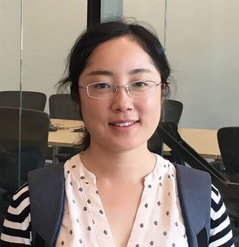
Dr. Li Yan - Research Assistant Professor
Joined Stroka Lab in January 2020
Dr. Li Yan completed her Ph.D. in Prof. Zandong Li's lab at China Agricultural University. After completing her PhD. she joined Yunnan Key Laboratory of Primate Medical Research Center as a research fellow. She went on to complete her postdoctoral training at the University of Macau in the lab of Prof. Renhe Xu. Dr. Yan's research experiences generally focus on stem cell therapies, with specific expertise in stem cell culture, differentiation, genome editing of hPSCs by CRISPR/Cas9, and handling mice and non-human primate disease models. Her work has been published in the journals such as Biomaterials, Theranostics, Stem Cells, International Journal of Biological Sciences, Cell Death Discovery, and Frontiers in Immunology. Li recently was awarded a Launch Grant from the Maryland Stem Cell Research Fund, which will fund her independent projects for two years.
Joined Stroka Lab in January 2020
Dr. Li Yan completed her Ph.D. in Prof. Zandong Li's lab at China Agricultural University. After completing her PhD. she joined Yunnan Key Laboratory of Primate Medical Research Center as a research fellow. She went on to complete her postdoctoral training at the University of Macau in the lab of Prof. Renhe Xu. Dr. Yan's research experiences generally focus on stem cell therapies, with specific expertise in stem cell culture, differentiation, genome editing of hPSCs by CRISPR/Cas9, and handling mice and non-human primate disease models. Her work has been published in the journals such as Biomaterials, Theranostics, Stem Cells, International Journal of Biological Sciences, Cell Death Discovery, and Frontiers in Immunology. Li recently was awarded a Launch Grant from the Maryland Stem Cell Research Fund, which will fund her independent projects for two years.
Graduate STudents

Ian Smith - Bioengineering PhD Candidate and Clark Doctoral Fellow
Joined Stroka Lab in August 2020
Ian Smith graduated in December 2019 from the Georgia Institute of Technology with a B.S. in Biomedical Engineering and a minor in Chemistry. As an undergrad, he performed research in Dr. Andres Garcia’s lab. The role of his project was to define the interplay between the forces and signals that direct cell behavior and the cell’s integrin-mediated adhesion to hydrogels. To support his work in the lab, Ian was awarded Georgia Tech’s President’s Undergraduate Research Award in the spring of 2019. The award allowed him to present his findings at the Georgia Undergraduate Research Conference. In Dr. Stroka’s Lab, he is interested in continuing to understand how biomechanical cues from the microenvironment direct cell behavior. Ian was a recipient of the Clark Doctoral Fellowship from the A. James and Alice B. Clark Foundation. Most recently, he was awarded a $15,000 graduate fellowship from the International Foundation for Ethical Research (IFER), which is renewable for up to 3 years ($45,000 total). In his free time, Ian enjoys pottery, hiking, wood working, and traveling.
Joined Stroka Lab in August 2020
Ian Smith graduated in December 2019 from the Georgia Institute of Technology with a B.S. in Biomedical Engineering and a minor in Chemistry. As an undergrad, he performed research in Dr. Andres Garcia’s lab. The role of his project was to define the interplay between the forces and signals that direct cell behavior and the cell’s integrin-mediated adhesion to hydrogels. To support his work in the lab, Ian was awarded Georgia Tech’s President’s Undergraduate Research Award in the spring of 2019. The award allowed him to present his findings at the Georgia Undergraduate Research Conference. In Dr. Stroka’s Lab, he is interested in continuing to understand how biomechanical cues from the microenvironment direct cell behavior. Ian was a recipient of the Clark Doctoral Fellowship from the A. James and Alice B. Clark Foundation. Most recently, he was awarded a $15,000 graduate fellowship from the International Foundation for Ethical Research (IFER), which is renewable for up to 3 years ($45,000 total). In his free time, Ian enjoys pottery, hiking, wood working, and traveling.

Ken Brandon - Bioengineering MD/PhD Candidate and Clark Doctoral Fellow
Joined Stroka Lab in July 2021
Ken Brandon II was born in Alexandria, VA and spent much of his early years in the DMV area before moving to Georgia at the start of middle school. As a child of two military vets, Ken spent most of his summers as a student volunteer at the Atlanta VA Medical Center. Here he formed an interest in patient care and the application of science to human health and wellness. Ken received a bachelor’s degree in Chemistry and Chemical Engineering as a part of a dual-degree program from Oakwood University and the University of Alabama Huntsville. While a PhD was not originally on his radar, Ken gained invaluable research experiences ranging from the electrical conductivity of oceanic biofilms at the Naval Research Lab to proteolytic enzymes associated with cancer metastasis at Georgia Tech. This work opened opportunities to present at conferences. At the Annual Biomedical Research Conference for Minority Students, he learned about a unique program that integrated the training of a medical doctor with that of a scientist, which led him to join the University of Maryland’s Medical Scientist Training Program. Ken was a recipient of the Clark Doctoral Fellowship from the A. James and Alice B. Clark Foundation. Outside of the classroom and lab, Ken enjoys making people laugh (secretly wants to be a comedian), working with his hands, reading, writing, and trying new hobbies.
Joined Stroka Lab in July 2021
Ken Brandon II was born in Alexandria, VA and spent much of his early years in the DMV area before moving to Georgia at the start of middle school. As a child of two military vets, Ken spent most of his summers as a student volunteer at the Atlanta VA Medical Center. Here he formed an interest in patient care and the application of science to human health and wellness. Ken received a bachelor’s degree in Chemistry and Chemical Engineering as a part of a dual-degree program from Oakwood University and the University of Alabama Huntsville. While a PhD was not originally on his radar, Ken gained invaluable research experiences ranging from the electrical conductivity of oceanic biofilms at the Naval Research Lab to proteolytic enzymes associated with cancer metastasis at Georgia Tech. This work opened opportunities to present at conferences. At the Annual Biomedical Research Conference for Minority Students, he learned about a unique program that integrated the training of a medical doctor with that of a scientist, which led him to join the University of Maryland’s Medical Scientist Training Program. Ken was a recipient of the Clark Doctoral Fellowship from the A. James and Alice B. Clark Foundation. Outside of the classroom and lab, Ken enjoys making people laugh (secretly wants to be a comedian), working with his hands, reading, writing, and trying new hobbies.

Shohini Banerjee - Bioengineering PhD Candidate and Clark Doctoral Fellow
Joined Stroka Lab in August 2021
Shohini Banerjee earned her B.S. in Mechanical Engineering and minor in biology at Penn State University in May of 2021. She graduated with honors through the Schreyer Honors College, and conducted undergraduate research that culminated in her final thesis, Engineering Artificial Tissues Using Soft Droplet-Based Cellular Networks. In this project, Shohini optimized droplet interface bilayers to build networks of micron-sized liquid droplets in aqueous media that could serve as cellular scaffolds in tissue engineering applications. Her work earned her the Phillips Encouraging Woman in Mechanical Engineering Award and the Voith-Hydro Women in Engineering Award. In Dr. Stroka’s lab, she is interested in understanding the role of aquaporins in cell migration, especially in tumor cell metastasis. Shohini received the Clark Doctoral Fellowship from the A. James and Alice B. Clark Foundation when she started graduate school. She is also the recipient of the UMD Graduate School's Summer Research Fellowship and serves as a fellow for the UMD Writing Center. Outside of the lab, Shohini enjoys competitive ballroom dance, Indian classical dance, playing the flute, and reading novels.
Joined Stroka Lab in August 2021
Shohini Banerjee earned her B.S. in Mechanical Engineering and minor in biology at Penn State University in May of 2021. She graduated with honors through the Schreyer Honors College, and conducted undergraduate research that culminated in her final thesis, Engineering Artificial Tissues Using Soft Droplet-Based Cellular Networks. In this project, Shohini optimized droplet interface bilayers to build networks of micron-sized liquid droplets in aqueous media that could serve as cellular scaffolds in tissue engineering applications. Her work earned her the Phillips Encouraging Woman in Mechanical Engineering Award and the Voith-Hydro Women in Engineering Award. In Dr. Stroka’s lab, she is interested in understanding the role of aquaporins in cell migration, especially in tumor cell metastasis. Shohini received the Clark Doctoral Fellowship from the A. James and Alice B. Clark Foundation when she started graduate school. She is also the recipient of the UMD Graduate School's Summer Research Fellowship and serves as a fellow for the UMD Writing Center. Outside of the lab, Shohini enjoys competitive ballroom dance, Indian classical dance, playing the flute, and reading novels.

Nikka Givpoor - Bioengineering PhD Candidate and NIH CRTA Fellow
Joined Stroka Lab in February 2023 as undergrad
Joined Stroka Lab in August 2024 as PhD student
Nikka Givpoor graduated with a B.S in Bioengineering from the University of Maryland in May of 2024. During her undergrad experience, she first performed research under Dr. Ashkan Emadi to identify sensitivity of Glioblastoma cell lines to glutamine depletion. The role of her project was to induce glutamine depletion through the use of an asparaginase to lower cell proliferation and potentiate current chemotherapy drugs. Then, she joined the Stroka lab in February 2023. In the Stroka Lab, she is interested in continuing to understand how mechanical stresses in the tumor microenvironment influence the cancer cell behavior. Nikka was a recipient of the NIH supplemental award to fund her research for the summer of 2023. Nikka was also the recipient of UMD's ASPIRE award but had to decline due to the REU award. As a PhD student, Nikka has been selected to participate in the NCI/UMD Partnership for Integrated Cancer Research as a Cancer Research Training Award Fellow. Outside of the lab, Nikka enjoys spending time with her miniature schnauzer, playing tennis, and watching marvel movies.
Joined Stroka Lab in February 2023 as undergrad
Joined Stroka Lab in August 2024 as PhD student
Nikka Givpoor graduated with a B.S in Bioengineering from the University of Maryland in May of 2024. During her undergrad experience, she first performed research under Dr. Ashkan Emadi to identify sensitivity of Glioblastoma cell lines to glutamine depletion. The role of her project was to induce glutamine depletion through the use of an asparaginase to lower cell proliferation and potentiate current chemotherapy drugs. Then, she joined the Stroka lab in February 2023. In the Stroka Lab, she is interested in continuing to understand how mechanical stresses in the tumor microenvironment influence the cancer cell behavior. Nikka was a recipient of the NIH supplemental award to fund her research for the summer of 2023. Nikka was also the recipient of UMD's ASPIRE award but had to decline due to the REU award. As a PhD student, Nikka has been selected to participate in the NCI/UMD Partnership for Integrated Cancer Research as a Cancer Research Training Award Fellow. Outside of the lab, Nikka enjoys spending time with her miniature schnauzer, playing tennis, and watching marvel movies.
Undergraduate Students
Pranav Majeti (Cell Biology and Molecular Genetics '25)
Joined Stroka Lab in November 2022
Esha Chopra (Bioengineering '25)
Joined Stroka Lab in May 2023
ASPIRE Award (Summer 2023)
ASPIRE Award (Fall 2023)
Summer REU Program (2024)
Yoshi Chettri (Cell Biology and Genetics '25)
Joined Stroka Lab in September 2023
SPIRE Award from UMD Office of Undergraduate Research (Summer 2024)
Azkah Anjum (Bioengineering '26)
Joined Stroka Lab in September 2023
Summer REU Program (2024)
Joined Stroka Lab in November 2022
Esha Chopra (Bioengineering '25)
Joined Stroka Lab in May 2023
ASPIRE Award (Summer 2023)
ASPIRE Award (Fall 2023)
Summer REU Program (2024)
Yoshi Chettri (Cell Biology and Genetics '25)
Joined Stroka Lab in September 2023
SPIRE Award from UMD Office of Undergraduate Research (Summer 2024)
Azkah Anjum (Bioengineering '26)
Joined Stroka Lab in September 2023
Summer REU Program (2024)
LAB GRADUATE ALUMNI
Name |
Degree |
Dates in Lab |
Awards |
Post-graduation position |
Ajmeeta Sangtani |
Ph.D., BIOE, 2019 Mentor: Dr. James Delehanty, NRL Co-Mentor: Dr. Stroka |
Spring 2015 - Spring 2019 |
- Goldhaber Travel Award - Alan Berman Publication and Research Award |
Placement: USC-Allergan Pharmacology Fellowship Program |
Marina (Shumamovich) Pranda |
Ph.D., BIOE, 2019 |
Jan. 2015-Aug. 2019 |
- GRC Travel Award - Goldhaber Travel Award - International Conference Student Support Award - Clark School of Engineering Future Faculty Program - GRAD Day Travel Award for Best Talk - Outstanding Graduate Assistant Award, UMD - BMES Career Development Award - Ann G. Wylie Dissertation Fellowship |
Placement: Lecturer at UMD BIOE (Spring 2020) Currently: Project Manager at Alliance for Diversity in Science and Engineering (ADSE) |
Kelsey Gray |
Ph.D., BIOE, 2019 |
Jan. 2015-Dec. 2019 |
- Fischell Fellowship, - NSF GRF Honorable Mention (x2) - Outstanding Graduate Assistant Award, UMD - Goldhaber Travel Award - International Conference Student Support Award - Cellular and Molecular Bioengineering Conference Student/Fellow Travel Award - Dr. Mabel S. Spencer Award for Excellence in Graduate Achievement - Dean’s Fellowship - Biomedical Engineering Society Student Travel Award - Clark School of Engineering Future Faculty Program - Cellular and Molecular Bioengineering Shooting Star Award - Three Minute Thesis Competition 2nd place winner - BMES Career Development Award |
Placement: Senior Scientist at Pfizer Currently: Principal Scientist at Pfizer (Cell Culture Operations, Vaccine R&D) |
Mary Doolin |
Ph.D., BIOE, 2020 |
Mar. 2016-Aug. 2020 |
- NIH/NHLBI NSRA (F31) Fellowship - Goldhaber Travel Award (2x) - Graduate Student Summer Research Fellowship - Biomedical Engineering Society Student Travel Award |
Placement: Postdoc, Astrazeneca Currently: Scientist II, Rooster Bio |
Rebecca Moriarty |
PhD, BIOE, 2021 |
Jan. 2017-Aug. 2021 |
- Goldhaber Travel Award, UMD - Graduate Student Summer Research Fellowship, UMD - UMD/NCI Partnership Program Fellowship |
Placement: Research Scientist, Vertex Pharmaceuticals |
Michelle Baird |
PhD, Biophysics, 2021 Mentor: Dr. Clare Waterman, NIH/NHLBI Co-Mentor: Dr. Stroka |
Jan. 2016-Nov. 2021 |
- Fellows Award for Research Excellence (FARE) travel award - 6 invited presentations -DECODE Chromatin Special Interest Group “Favorite Abstract of 2021” award - selected by the Duke Cell Biology Department for the “Rising Stars Symposium Series” in 2021-2022 |
Placement: Postdoc, NIH/NHLBI in Waterman Lab |
Ariana DeCastro |
PhD, BIOE, 2023 |
Aug. 2018-May 2023 |
-Clark Doctoral Fellowship -Goldhaber Travel Award -Graduate Student Summer Research Fellowship -Outstanding Graduate Student Award -Ann G. Wylie Dissertation Award -Entrepreneurial Lead on an NSF I-Corps-funded project |
Placement: Medical Writer, Technical Resources International |
Lab UNDERGRADUATE Alumni
Name |
Degree |
Dates in Lab |
Awards |
Post-graduation position |
Kenneth Wesley Bryant |
B.S. BIOE, 2015 |
Jan. 2015-Dec. 2015 |
--- |
Unknown |
Matthew Angelico |
B.S. BIOE, 2016 |
Jan. 2015-Dec. 2015 |
ASPIRE Scholar |
Appian Consulting |
Dakota Katz |
B.S. BIOE, 2016 |
Jan. 2015-May 2016 |
ASPIRE Scholar, Maryland Summer Scholar |
PhD program, WashU BME (Defended PhD in August 2021) Current: Scientist I, Artemys Foods (Cell Line Engineering Team) |
Erica Brown |
B.S. BIOE, 2018 |
Jan. 2016-Dec. 2016 |
ASPIRE Scholar (2x) |
Initial: R&D Associate, AstraZeneca Current: PhD program, UPenn Cellular and Molecular Biology |
Jack Siglin |
B.S. Physiology and Neurobiology, 2017 |
Apr. 2016-Dec. 2016 |
--- |
MD program, University of Maryland School of Medicine |
Danielle Rossi |
B.S. BIOE, 2017 |
Sept. 2016-Dec. 2016 |
SEEDS Fellow |
Initial: MSE program, UPenn BIOE Current: R&D Leadership Development Program Engineer, Johnson and Johnson |
Dani Khalilzadeh |
B.S. BIOE, 2017 |
Jan. 2015-Apr. 2017 |
Maryland Summer Scholar and SEEDS Fellow |
Unknown |
Sukriti Ghosh |
B.S. BIOE, 2018 |
Sept. 2016-May 2017 |
--- |
Initial: FDA Orise Fellow Current: Research Associate, NYU Langone Health |
Nate Girma |
B.S., Santa Clara University, 2019 |
Summer 2018 |
NSF REU Program |
Associate Consultant at Planisware |
Greg Dawson |
B.S. Physiology and Neurobiology, 2019 |
Jan. 2017-Aug. 2018 |
Maryland Summer Scholar |
MD program, University of Maryland School of Medicine |
Paula Kleyman |
B.S. BIOE, 2019 |
Mar. 2018-Dec. 2018 |
--- |
Process Engineer, Catalent Pharma Solutions |
Brittney Murugesan |
B.S. BIOE, 2020 |
Nov. 2017-Dec. 2018 |
Maryland Summer Scholar |
DC Analyst, Deloitte |
Thea Ornstein |
B.S. BIOE, 2019 |
Aug. 2017-May 2019 |
HHMI Fellow BMES Travel Award NSF GRF Honorable Mention, NSF Graduate Research Fellowship |
Initial: PhD program, Georgia Tech BME Current: Research Associate, Be Biopharma |
Maddie Hurwitz |
B.S., Williams College 2021 |
Summer 2019 |
NSF REU Program |
MD program at UVA |
John Merlo-Coyne |
B.S. Biology, 2021 |
Jan. 2019-Dec. 2019 |
--- |
Initial: Researcher, NPS, Noatek National Preserve Current: Production cook, McMurdo Station (Antarctica) |
Neal Kewalramani |
B.S., BIOE, 2020 |
Sept. 2018-May 2002 |
--- |
PhD program, Boston University Bioinformatics |
Jae Jung |
B.S., BIOE, 2021 |
Aug. 2018-Aug. 2020 |
ASPIRE Scholar |
Process Development Engineer, Rooster Bio |
Adam Landa |
B.S., BIOE, 2021 |
Feb. 2020-Aug 2021 |
--- |
Post-bac, NIH |
Katarina Koziol |
B.S., BIOE, 2022 |
Sep. 2021-Dec. 2021 |
--- |
Applying for PhD programs |
Katelyn Kunert |
B.S., BIOE 2022 |
June 2019-May 2022 |
ASPIRE Scholar |
Research Engineer, Moderna |
Cole Dwiggins |
B.S., 2022 |
Nov. 2020-May 2022 |
ASPIRE Scholar (2x) |
Post-bac, NIH |
Lauren Griffith |
B.S., Biology exp. 2023 (Mansfield University) |
June 2022-Aug. 2022 |
NIH STEP-UP Program |
PhD program, UNC Chapel Hill Biological and Biomedical Sciences |
Mariam Rahman |
B.S., BIOE (exp. 2024) |
Mar. 2022=Mar. 2023 |
--- |
B.S. in progress |
Hiya Sawhney |
B.S., BIOE, 2022 |
May 2022-Jan. 2023 |
BIOE Honors Program Maryland Summer Scholar |
Post-bac, NIH |
Allison Moses |
B.S., BIOE 2023 |
June 2021-May 2023 |
NSF REU Participant ASPIRE Scholar |
PhD program, UMD Bioengineering |
William Rodriguez Frank |
B.S., Expected 2024 (University of Puerto Rico) |
June 2023-Aug. 2023 |
UM-STAR Program |
B.S. in progress |
Autumn Hengen |
B.S. BIOE, 2024 |
Feb. 2022-May 2024 |
BIOE Honors Program ASPIRE Scholar (2x) Maryland Summer Scholar Award Outstanding Senior Award from the Fischell Dept. of Bioengineering NSF Graduate Research Fellowship Honorable Mention |
PhD program, Georgia Tech Biomedical Engineering |
Udit Gupta |
B.S., BIOE, 2024 |
April 2022-May 2024 |
ASPIRE Scholar (2x) Maryland Summer Scholar Award Outstanding Senior Award from the Fischell Dept. of Bioengineering NSF Graduate Research Fellowship Awardee |
PhD program, Johns Hopkins University Biomedical Engineering |
Nikka Givpoor |
B.S., BIOE, 2024 |
Feb. 2023-May 2024 |
NIH summer supplement ASPIRE Scholar (declined due to NIH supplement) |
PhD program, UMD Bioengineering (Stroka Lab!) |
The Cells
We couldn't do it without the help of these guys.
Group Photos
Ice cream break and enjoying Daisy the Schnauzer (thanks, Nikka!) - July 2023
Fall party at Kim's house, including many honorary lab members and junior scientists! - October 2022
In the elevator after lab lunch - November 2022
The group - May 2022
Back row from left: Udit, Li, Ariana, Mariam
Front row from left: Cole, Ian, Ken, Shohini, Katelyn, Kim
Back row from left: Udit, Li, Ariana, Mariam
Front row from left: Cole, Ian, Ken, Shohini, Katelyn, Kim
The group - August 2021
From Left - Adam, Ian, Kim, Becca, Ariana, Allison, Ben, Li
From Left - Adam, Ian, Kim, Becca, Ariana, Allison, Ben, Li
Lab Holiday e-card Zoom day - December 2020
Top from Left - Becca, Kim, Adam
Middle from Left - Li, Ian, Ariana
Bottom from Left - Katelyn, Ken
Top from Left - Becca, Kim, Adam
Middle from Left - Li, Ian, Ariana
Bottom from Left - Katelyn, Ken
Kelsey's defense - August 2019
From Left - Marina, Kim, Kelsey, Becca, Ariana, Mary
From Left - Marina, Kim, Kelsey, Becca, Ariana, Mary
Fall Lab Party - November 2018
(Our Junior Scientist requested that the M&M make a come-back this year)
(Our Junior Scientist requested that the M&M make a come-back this year)
The group - June 2018
From Left - Thea, Paula, Becca, Marina, Mary, Kim, Kelsey, Brittney, Greg
From Left - Thea, Paula, Becca, Marina, Mary, Kim, Kelsey, Brittney, Greg
Ice cream trip to the Maryland Dairy with our favorite (4-year-old) junior scientist! - June 2018
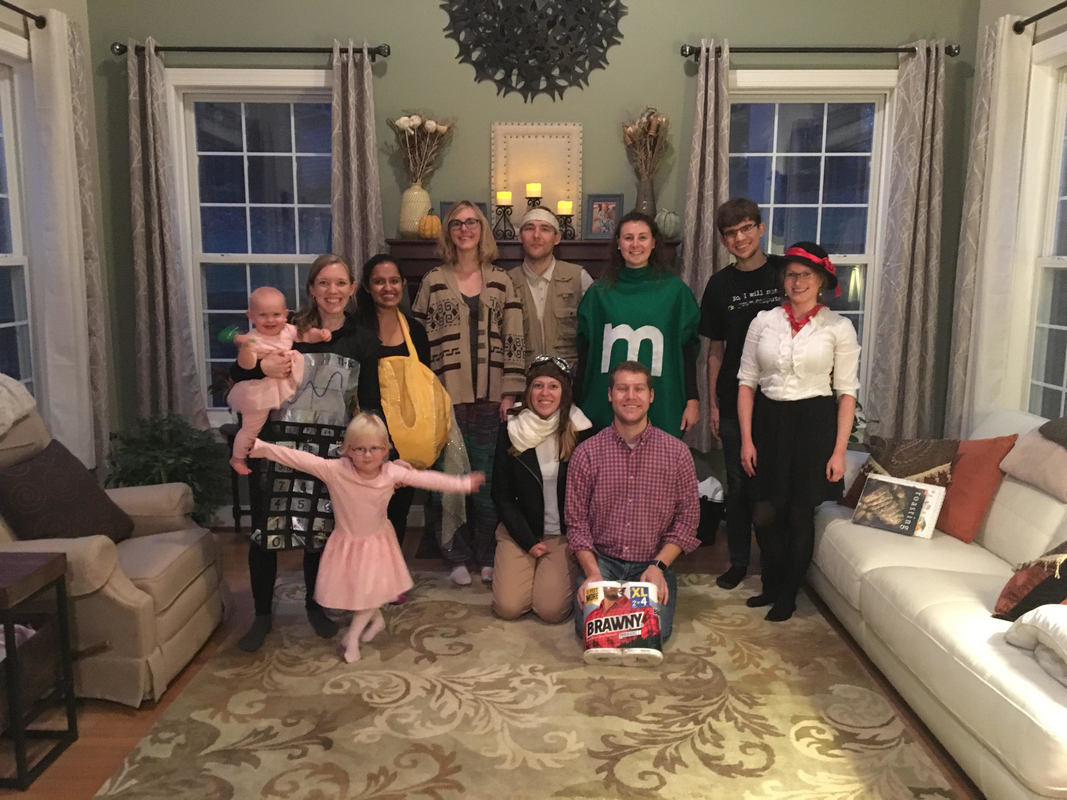
Fall Lab Party - November 2017
Ice cream trip to the Maryland Dairy with our favorite junior scientist! - June 2017
The mildest of the "funny photos" - June 2016
From Left - Kim, Erica, Michelle, Kelsey, Marina, Mary, Jack
From Left - Kim, Erica, Michelle, Kelsey, Marina, Mary, Jack
The group - June 2016
From Left - Marina, Kelsey, Jack, Michelle, Erica, Mary. Kim in front middle.
From Left - Marina, Kelsey, Jack, Michelle, Erica, Mary. Kim in front middle.
Lab Picnic - July 2015
From Left - Marina, Wes, Dakota, Gabriella, Kim, Matt, Kelsey
From Left - Marina, Wes, Dakota, Gabriella, Kim, Matt, Kelsey
The first group - May 2015
From Left - Dani, Dakota, Kelsey, Matt, Marina, Wes, Kim
From Left - Dani, Dakota, Kelsey, Matt, Marina, Wes, Kim
Graduate Student Bio Archive
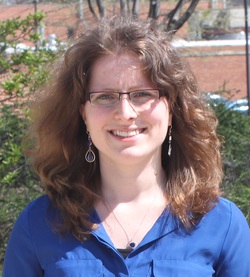
Marina (Shumakovich) Pranda - Bioengineering PhD Candidate and Future Faculty Fellow
Joined Stroka Lab in March 2015 and defended PhD in June 2019
Marina Pranda graduated from Cornell University in January of 2014 with a B.S. in Biological Engineering and a minor in Biomedical Engineering. At Cornell, she conducted research in the Analytical Microsystems and Biosensors Lab under the direction of Dr. Antje Baeumner. Marina worked on the development of a point-of-care biosensor for thrombin detection and presented her findings at an American Chemical Society Regional Meeting in 2013. During her studies at Cornell, Marina received three undergraduate research grants, a competitive undergraduate research award, and an alumni scholarship in 2013. In the summer of 2013, Marina conducted research in the Amplified Molecular Sensors Lab at the University of Maryland under the direction of Dr. Ian White. She worked on the microfluidic synthesis of chitosan beads. After graduating from Cornell, Marina spent a semester working for the biotherapeutics start-up, Glycobia. Marina is interested in studying the biomechanics of cancer metastasis and building lab-on-a-chip models. Specifically, in Dr. Stroka’s lab Marina is working on engineering microenvironments in microfluidic devices for the study of metastatic tumor cell and blood-brain-barrier interactions. Marina has presented posters and talks at national and international conferences and received the International Conference Student Support Award and Goldhaber Travel Award from the University of Maryland Graduate School. Marina is a Clark School Future Faculty Fellow and received the 2017 Outstanding Graduate Assistant Award from the UMD Grad School. She also received the 2017 BMES Career Development Award. Most recently, she was awarded the Ann G. Wylie Dissertation Award ($15,000) from the UMD Grad School for fall 2018. She is involved in the Bioengineering Graduate Student Society and served as the Vice President of Academic Affairs for the 2016-2017 school year. Marina is passionate about teaching and has been engaged in outreach during her undergraduate and graduate studies. In her free time, Marina likes to hike, run, be outdoors, travel, and read.
Joined Stroka Lab in March 2015 and defended PhD in June 2019
Marina Pranda graduated from Cornell University in January of 2014 with a B.S. in Biological Engineering and a minor in Biomedical Engineering. At Cornell, she conducted research in the Analytical Microsystems and Biosensors Lab under the direction of Dr. Antje Baeumner. Marina worked on the development of a point-of-care biosensor for thrombin detection and presented her findings at an American Chemical Society Regional Meeting in 2013. During her studies at Cornell, Marina received three undergraduate research grants, a competitive undergraduate research award, and an alumni scholarship in 2013. In the summer of 2013, Marina conducted research in the Amplified Molecular Sensors Lab at the University of Maryland under the direction of Dr. Ian White. She worked on the microfluidic synthesis of chitosan beads. After graduating from Cornell, Marina spent a semester working for the biotherapeutics start-up, Glycobia. Marina is interested in studying the biomechanics of cancer metastasis and building lab-on-a-chip models. Specifically, in Dr. Stroka’s lab Marina is working on engineering microenvironments in microfluidic devices for the study of metastatic tumor cell and blood-brain-barrier interactions. Marina has presented posters and talks at national and international conferences and received the International Conference Student Support Award and Goldhaber Travel Award from the University of Maryland Graduate School. Marina is a Clark School Future Faculty Fellow and received the 2017 Outstanding Graduate Assistant Award from the UMD Grad School. She also received the 2017 BMES Career Development Award. Most recently, she was awarded the Ann G. Wylie Dissertation Award ($15,000) from the UMD Grad School for fall 2018. She is involved in the Bioengineering Graduate Student Society and served as the Vice President of Academic Affairs for the 2016-2017 school year. Marina is passionate about teaching and has been engaged in outreach during her undergraduate and graduate studies. In her free time, Marina likes to hike, run, be outdoors, travel, and read.
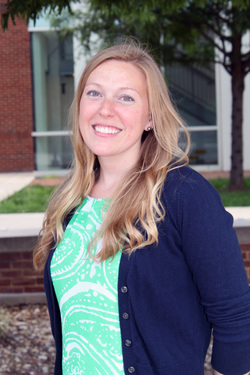
Kelsey Gray - Bioengineering PhD Candidate, Fischell Fellow, and Future Faculty Fellow
Joined Stroka Lab in March 2015 and defended PhD in August 2019
Kelsey Gray graduated in May 2012 from the University of Delaware with a Bachelor of Chemical Engineering degree and minors in Biochemical Engineering and Biomedical Engineering. As an undergraduate, she performed research at the University of Maryland in Dr. Gregory Payne’s lab where she worked on electrodeposition of stimuli responsive polymers (e.g. chitosan) to bridge the bio-device interface for lab-on-a-chip applications. While working in the Payne lab, Kelsey worked on an industry-university team developing immunosensors for point-of-care diagnostics, and traveled to France for several weeks to initiate a collaboration in Lyon. After graduation, she worked for a generic injectable pharmaceutical manufacturing company in NC where she gained experience with cGMP, regulatory requirements, product quality, and exception reports. During her time at the company, she won four awards for her contribution to various projects and regulatory inspections. As a graduate student, she is working to develop an electrodeposited blood-brain barrier-on-a-chip for use in understanding the mechanobiology of brain endothelium, and the role of extracellular vesicles in cellular communication at the blood-brain barrier. In 2014, Kelsey received the UMD Bioengineering Merit Scholarship and was awarded the Fischell Fellowship in Bioengineering to fully fund her graduate degree. Kelsey received the 2016 Outstanding Graduate Assistant Award and the 2017 Dr. Mabel S. Spencer Award for Excellence in Graduate Achievement ($15,000) from the UMD Grad School. She also won numerous competitive travel awards to give talks at national and international conferences, including the 2017 Cellular and Molecular Bioengineering (CMBE) Travel Award, 2017 BMES Travel Award, 2018 Shooting Star Award from CMBE, 2018 BMES Career Development Award, as well as the UMD Grad School's International Student Support Award and Goldhaber Travel Award. Kelsey is also a Clark School of Engineering Future Faculty Fellow. Kelsey also plays an active role in the department, having served as the Vice President of Academic Affairs (2015-2016) and President (2016-2018) of the Bioengineering Graduate Student Society. Outside of research, she enjoys crafting and do-it-yourself projects, picking Maryland blue crabs, and water sports on the Chesapeake Bay.
Joined Stroka Lab in March 2015 and defended PhD in August 2019
Kelsey Gray graduated in May 2012 from the University of Delaware with a Bachelor of Chemical Engineering degree and minors in Biochemical Engineering and Biomedical Engineering. As an undergraduate, she performed research at the University of Maryland in Dr. Gregory Payne’s lab where she worked on electrodeposition of stimuli responsive polymers (e.g. chitosan) to bridge the bio-device interface for lab-on-a-chip applications. While working in the Payne lab, Kelsey worked on an industry-university team developing immunosensors for point-of-care diagnostics, and traveled to France for several weeks to initiate a collaboration in Lyon. After graduation, she worked for a generic injectable pharmaceutical manufacturing company in NC where she gained experience with cGMP, regulatory requirements, product quality, and exception reports. During her time at the company, she won four awards for her contribution to various projects and regulatory inspections. As a graduate student, she is working to develop an electrodeposited blood-brain barrier-on-a-chip for use in understanding the mechanobiology of brain endothelium, and the role of extracellular vesicles in cellular communication at the blood-brain barrier. In 2014, Kelsey received the UMD Bioengineering Merit Scholarship and was awarded the Fischell Fellowship in Bioengineering to fully fund her graduate degree. Kelsey received the 2016 Outstanding Graduate Assistant Award and the 2017 Dr. Mabel S. Spencer Award for Excellence in Graduate Achievement ($15,000) from the UMD Grad School. She also won numerous competitive travel awards to give talks at national and international conferences, including the 2017 Cellular and Molecular Bioengineering (CMBE) Travel Award, 2017 BMES Travel Award, 2018 Shooting Star Award from CMBE, 2018 BMES Career Development Award, as well as the UMD Grad School's International Student Support Award and Goldhaber Travel Award. Kelsey is also a Clark School of Engineering Future Faculty Fellow. Kelsey also plays an active role in the department, having served as the Vice President of Academic Affairs (2015-2016) and President (2016-2018) of the Bioengineering Graduate Student Society. Outside of research, she enjoys crafting and do-it-yourself projects, picking Maryland blue crabs, and water sports on the Chesapeake Bay.
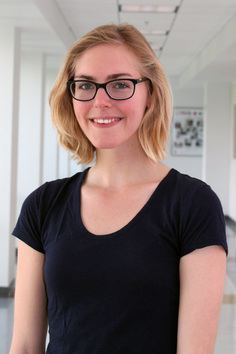
Mary Doolin - Bioengineering PhD Candidate and NIH F31 Fellow
Joined Stroka Lab in March 2016 and defended in June 2020
Mary Doolin graduated from the University of Delaware in May 2015 with a Bachelor of Biomedical Engineering degree and minors in Computer Science and Bioelectrical Engineering. As an undergraduate, she performed research in the Neuromuscular Biomechanics Lab under Dr. Jill Higginson. The goal of her project was to increase the effectiveness of physical rehabilitation for individuals with an injured lower limb using motion capture techniques. She presented her project results at the 2015 Gait and Clinical Movement Analysis Society conference. Mary also performed research under Dr. Li Liao in bioinformatics, where she developed a computer program that aids in predicting protein interactions. In summer months, Mary held internship positions at IBM and Covidien. While at the University of Delaware, she won the Biomedical Engineering Distinguished Junior Award, Biomedical Engineering Distinguished Senior Award, and John K. Scoggin, Sr. Memorial Award. As a graduate student, Mary is interested in stem cell mechanobiology and biomechanics, specifically how physical cues from the microenvironment direct stem cell differentiation. Currently, she is investigating the mechanisms that enable mesenchymal stem cells to migrate through confined channels in order to inform and improve tissue engineered scaffold designs. She presented her results at the 2017 and 2020 Cellular and Molecular Bioengineering Conference, both of which she was awarded the Goldhaber Travel Award (twice) from the UMD Grad School, and also at the 2017 BMES Meeting, for which she was awarded the BMES Student Travel Award. She is also the recipient of the 2017 Graduate Student Summer Fellowship ($5,000) from the UMD Grad School. Most recently, Mary was awarded an NIH F31 Predoctoral Fellowship from NHLBI. When not in the lab, Mary enjoys hiking, practicing yoga, listening to music, and home brewing.
Joined Stroka Lab in March 2016 and defended in June 2020
Mary Doolin graduated from the University of Delaware in May 2015 with a Bachelor of Biomedical Engineering degree and minors in Computer Science and Bioelectrical Engineering. As an undergraduate, she performed research in the Neuromuscular Biomechanics Lab under Dr. Jill Higginson. The goal of her project was to increase the effectiveness of physical rehabilitation for individuals with an injured lower limb using motion capture techniques. She presented her project results at the 2015 Gait and Clinical Movement Analysis Society conference. Mary also performed research under Dr. Li Liao in bioinformatics, where she developed a computer program that aids in predicting protein interactions. In summer months, Mary held internship positions at IBM and Covidien. While at the University of Delaware, she won the Biomedical Engineering Distinguished Junior Award, Biomedical Engineering Distinguished Senior Award, and John K. Scoggin, Sr. Memorial Award. As a graduate student, Mary is interested in stem cell mechanobiology and biomechanics, specifically how physical cues from the microenvironment direct stem cell differentiation. Currently, she is investigating the mechanisms that enable mesenchymal stem cells to migrate through confined channels in order to inform and improve tissue engineered scaffold designs. She presented her results at the 2017 and 2020 Cellular and Molecular Bioengineering Conference, both of which she was awarded the Goldhaber Travel Award (twice) from the UMD Grad School, and also at the 2017 BMES Meeting, for which she was awarded the BMES Student Travel Award. She is also the recipient of the 2017 Graduate Student Summer Fellowship ($5,000) from the UMD Grad School. Most recently, Mary was awarded an NIH F31 Predoctoral Fellowship from NHLBI. When not in the lab, Mary enjoys hiking, practicing yoga, listening to music, and home brewing.
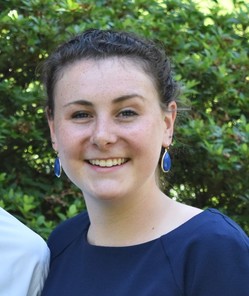
Rebecca Moriarty - Bioengineering PhD Candidate and CRTA Fellow
Joined Stroka Lab in January 2017 and defended in July 2021
Becca Moriarty graduated in Mary 2016 from the University of Maryland, College Park, with a B.S. in Biological Sciences and a minor in Spanish Language and Cultures. As an undergraduate, she performed research in the Tissue Engineering and Biomaterials Lab (TEBL) under the direction of Dr. John Fisher. Her undergraduate thesis focused on a coculture system to aid in prevascularization of a large tissue engineered bone construct, and she also presented her findings at the 2015 Biomedical Engineering Society Meeting. Prior to her work in the TEBL, she held previous summer internships at RoosterBio, Inc., and at the National Cancer Institute-Frederick, where she worked under Dr. Susan Mackem. In Dr. Stroka's lab, Becca is interested in understanding the role that physical confinement plays in regulating tumor cell cycle progression. Becca has been awarded the Goldhaber Travel Award, as well as the Graduate Student Summer Research Fellowship from the UMD Grad School. Starting in fall 2018, Becca has been supported by a competitive Cancer Research Training Award from the NCI, through the UMD-NCI Partnership for Integrative Cancer Research. Becca has presented her work at the Biomedical Engineering Society Annual Meeting and American Society for Cell Biology Meeting. When she isn't in the lab, Becca enjoys running, hiking, cooking, and traveling.
Joined Stroka Lab in January 2017 and defended in July 2021
Becca Moriarty graduated in Mary 2016 from the University of Maryland, College Park, with a B.S. in Biological Sciences and a minor in Spanish Language and Cultures. As an undergraduate, she performed research in the Tissue Engineering and Biomaterials Lab (TEBL) under the direction of Dr. John Fisher. Her undergraduate thesis focused on a coculture system to aid in prevascularization of a large tissue engineered bone construct, and she also presented her findings at the 2015 Biomedical Engineering Society Meeting. Prior to her work in the TEBL, she held previous summer internships at RoosterBio, Inc., and at the National Cancer Institute-Frederick, where she worked under Dr. Susan Mackem. In Dr. Stroka's lab, Becca is interested in understanding the role that physical confinement plays in regulating tumor cell cycle progression. Becca has been awarded the Goldhaber Travel Award, as well as the Graduate Student Summer Research Fellowship from the UMD Grad School. Starting in fall 2018, Becca has been supported by a competitive Cancer Research Training Award from the NCI, through the UMD-NCI Partnership for Integrative Cancer Research. Becca has presented her work at the Biomedical Engineering Society Annual Meeting and American Society for Cell Biology Meeting. When she isn't in the lab, Becca enjoys running, hiking, cooking, and traveling.
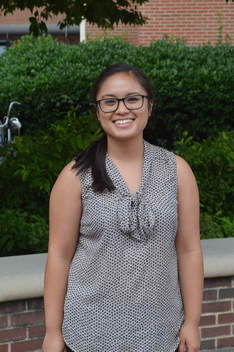
Ariana DeCastro - Bioengineering PhD Candidate and Clark Doctoral Fellow
Joined Stroka Lab in August 2018
Ariana DeCastro received her Bachelors of Science in Biomedical Engineering in May 2018 from Virginia Commonwealth University. As an undergraduate she was awarded an undergraduate scholarship position with Virginia Commonwealth University’s Initiative for Maximizing Student Diversity (IMSD) research training program in April 2016. Through the IMSD program Ariana was able to conduct research under Dr. Christopher Lemmon in the Matrix Mechanobiology lab. The goal of her project was to fabricate micropillar arrays with physiologically relevant stiffness to be able to better characterize cell behavior during normal and disease states. She presented her work at the Center on Health Disparities Summer Research Symposium and the Annual Biomedical Research Conference for Minority Students. To further support her work under Dr. Christopher Lemmon during the summer of 2017, Ariana was awarded the National Science Foundation Research Experience for Undergraduate Students. The goal of her project was to fabricate externally stretched micropillar arrays to quantify the mechanical properties of the extracellular matrix. She presented her work at the Biomedical Engineering Society Annual Meeting and the Annual Biomedical Research Conference for Minority Students. Ariana was a recipient of the Clark Doctoral Fellowship from the A. James and Alice B. Clark Foundation during her first year of graduate school. She was awarded a Goldhaber Travel Award from the UMD Graduate School to present at the 2020 Cellular and Molecular Bioengineering Conference. Most recently, she was awarded the 2020 Graduate Student Summer Research Fellowship, Outstanding Graduate Assistant Award, and Ann G. Wylie Dissertation Award, all from the UMD Grad School. Ariana also serves as Entrepreneurial Lead on an NSF I-Corps-funded project in collaboration with a lab at NIST.
Joined Stroka Lab in August 2018
Ariana DeCastro received her Bachelors of Science in Biomedical Engineering in May 2018 from Virginia Commonwealth University. As an undergraduate she was awarded an undergraduate scholarship position with Virginia Commonwealth University’s Initiative for Maximizing Student Diversity (IMSD) research training program in April 2016. Through the IMSD program Ariana was able to conduct research under Dr. Christopher Lemmon in the Matrix Mechanobiology lab. The goal of her project was to fabricate micropillar arrays with physiologically relevant stiffness to be able to better characterize cell behavior during normal and disease states. She presented her work at the Center on Health Disparities Summer Research Symposium and the Annual Biomedical Research Conference for Minority Students. To further support her work under Dr. Christopher Lemmon during the summer of 2017, Ariana was awarded the National Science Foundation Research Experience for Undergraduate Students. The goal of her project was to fabricate externally stretched micropillar arrays to quantify the mechanical properties of the extracellular matrix. She presented her work at the Biomedical Engineering Society Annual Meeting and the Annual Biomedical Research Conference for Minority Students. Ariana was a recipient of the Clark Doctoral Fellowship from the A. James and Alice B. Clark Foundation during her first year of graduate school. She was awarded a Goldhaber Travel Award from the UMD Graduate School to present at the 2020 Cellular and Molecular Bioengineering Conference. Most recently, she was awarded the 2020 Graduate Student Summer Research Fellowship, Outstanding Graduate Assistant Award, and Ann G. Wylie Dissertation Award, all from the UMD Grad School. Ariana also serves as Entrepreneurial Lead on an NSF I-Corps-funded project in collaboration with a lab at NIST.
